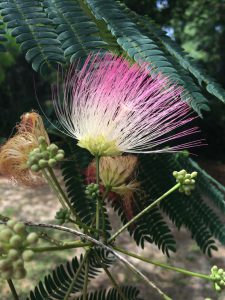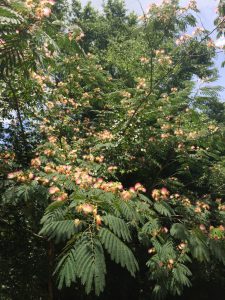All along the roadsides and in home landscapes in summer, a profusion of fluffy pink blossoms are adorning trees known as mimosa, or Albizia julibrissin. This native of China was introduced to home landscapes in this country in the 1700’s to enjoy the fragrant, showy flowers and fine, lacy foliage. However, there is a dark side to this lovely tree. After blooming, it produces an abundance of pods each containing 5 to 10 seeds. Seeds can be spread by wildlife and water; this is evidenced by the appearance of mimosa trees along the roadways, streams and in our natural areas. The seeds can also remain dormant for many years, allowing the trees to keep sprouting long after the mother tree is gone.
Mimosa has been categorized as an invasive exotic plant in Florida by the University of Florida IFAS Assessment of Non-Native Plants in Florida’s Natural Areas. This designation means that the tree has not only naturalized, but is expanding on its own in Florida native plant communities. This expansion means that our native plants in natural areas get crowded out by mimosa as it reproduces so prolifically.
The Florida Exotic Pest Plant Council (FLEPPC) publishes a list of non-native plants that have been determined to be invasive. Click here for the most recent 2017 list!
The first step in controlling this pest plant is to remove existing plants in the landscape. Cutting it down at soil level and immediately painting the stump with a 25% solution of glyphosate or triclopyr should do the trick. Further details and control methods can be found here.
There are some native trees that make excellent alternatives to mimosa such as fringe tree (Chionanthus virginicus), silverbell (Halesia carolina) and flowering dogwood (Cornus florida).
Guest Author:
Residential Horticulture Agent
Santa Rosa County
- Killer Turkey Food Plot - January 31, 2025
- Common Wildlife Food Plot Mistakes - November 8, 2024
- Seasonality of Prescribed Burning Workshop - February 23, 2024


